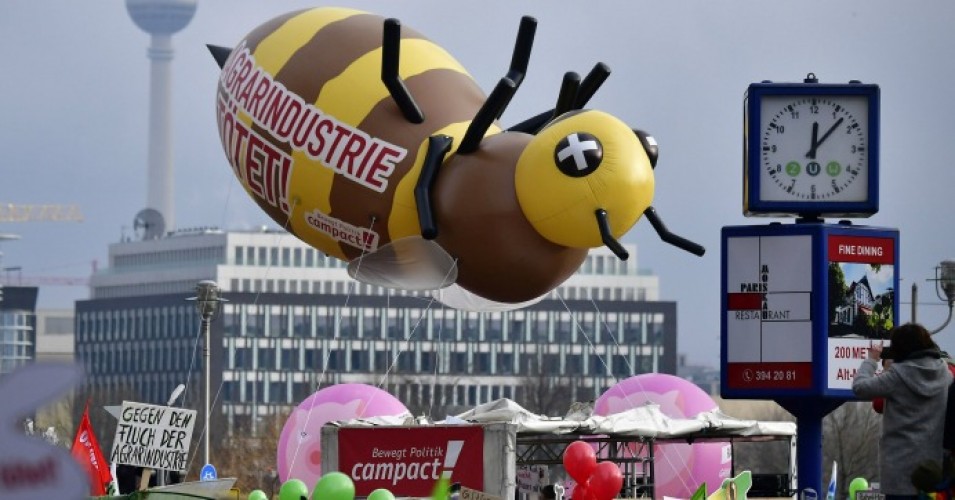Because ‘a World without Insects Is Not Worth Living in,’ Germany Announces Plan to Ban Glyphosate
EUROPE, ENVIRONMENT, ORGANIC, GMO, GENETIC ENGINEERING, 9 Sep 2019
Andrea Germanos – Common Dreams
“What we need is more humming and buzzing.”

Protesters hold balloons on January 20, 2018 in Berlin during a demonstration under the slogan “We are fed up” against agricultural politics and the use of glyphosate, dumping exports and for sustainable agriculture.
Tobias Schwarz/AFP/Getty Images
4 Sep 2019 – The German government announced today it had agreed on a plan to phase out the use of glyphosate—the key chemical in the weedkiller Roundup—with a total ban set to begin by the end of 2023.
“Way to go, Germany!” tweeted the U.S.-based advocacy group Organic Consumers Association.
Chancellor Angela Merkel’s cabinet agreed to the plan today. The proposal, reported Bloomberg, also says that the “government intends to oppose any request for the E.U. to renew the license to produce the weedkiller, according to a release by the environment ministry.”
The European Commission, the E.U.’s rules and regulations body, in 2017 renewed the license for glyphosate in the bloc through the end of 2022.
Germany’s environment Minister, Svenja Schulze, framed the new move as necessary to protect biodiversity, and said that “a world without insects is not worth living in”.
“What harms insects also harms people,” Schulze said at a press conference. “What we need is more humming and buzzing.”
Glyphosate is no longer exclusive to Monsanto’s Roundup, as it “is now off-patent and marketed worldwide by dozens of other chemical groups including Dow Agrosciences and Germany’s BASF,” as Reuters noted.
That’s despite the World Health Organization’s International Agency for Research on Cancer’s 2015 designation of glyphosate as a “probable carcinogen,” increasing concerns over its health effects, and mounting legal woes for Bayer, which acquired Monsanto last year, as multiple juries have found Roundup to have been a factor in plaintiffs’ cancers.
Such concerns prompted Austria to become the first E.U. country to ban glyphosate, a step it took in July.
Erwin Preiner, a member of the Austrian parliament who worked on the ban, said at the time, “We want to be a role model for other countries in the E.U. and the world.”
Our work is licensed under a Creative Commons Attribution-Share Alike 3.0 License. Feel free to republish and share widely.
Go to Original – commondreams.org
DISCLAIMER: The statements, views and opinions expressed in pieces republished here are solely those of the authors and do not necessarily represent those of TMS. In accordance with title 17 U.S.C. section 107, this material is distributed without profit to those who have expressed a prior interest in receiving the included information for research and educational purposes. TMS has no affiliation whatsoever with the originator of this article nor is TMS endorsed or sponsored by the originator. “GO TO ORIGINAL” links are provided as a convenience to our readers and allow for verification of authenticity. However, as originating pages are often updated by their originating host sites, the versions posted may not match the versions our readers view when clicking the “GO TO ORIGINAL” links. This site contains copyrighted material the use of which has not always been specifically authorized by the copyright owner. We are making such material available in our efforts to advance understanding of environmental, political, human rights, economic, democracy, scientific, and social justice issues, etc. We believe this constitutes a ‘fair use’ of any such copyrighted material as provided for in section 107 of the US Copyright Law. In accordance with Title 17 U.S.C. Section 107, the material on this site is distributed without profit to those who have expressed a prior interest in receiving the included information for research and educational purposes. For more information go to: http://www.law.cornell.edu/uscode/17/107.shtml. If you wish to use copyrighted material from this site for purposes of your own that go beyond ‘fair use’, you must obtain permission from the copyright owner.
Read more
Click here to go to the current weekly digest or pick another article:
EUROPE:
- Raised in a Colonial Death Cult: 600 Years of KU Leuven and still...
- The Rise of ‘Antidiplomacy’ in a Powerless Europe
- ‘Diplomatic Tsunami’ Nears as Europe Begins to Act against Israel’s ‘Complete Madness’ in Gaza
ENVIRONMENT:
- Climate Misinformation Turning Crisis into Catastrophe, Report Says
- Megadroughts Are on the Rise Worldwide
- Fire Weather
ORGANIC, GMO, GENETIC ENGINEERING:
